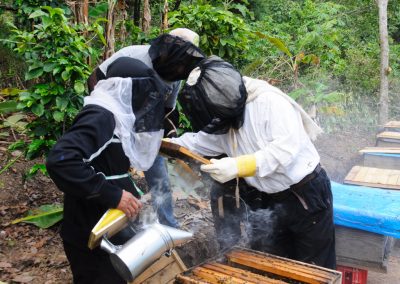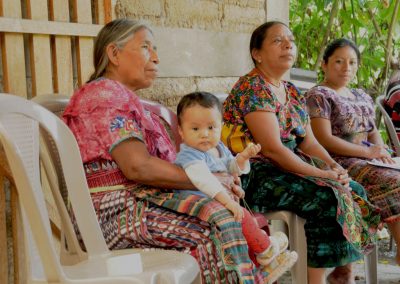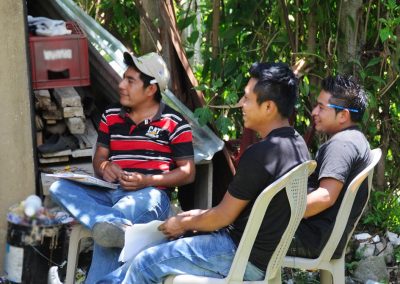One Day’s Wages is partnering with Pueblo a Pueblo to train a group of ten coffee farmers in beekeeping and honey production, providing participants with increased economic stability and income diversification.
Why San Pablo La Laguna, Guatemala?
In this small town, located in Guatemala’s rural southwestern highlands, many families count on coffee cultivation as their sole source of income. It is an unforgiving way to make a living, especially for farmers who are not landowners but are hired on a day-to-day basis to work on large plantations. Coffee crops are under constant threat from pests, drought, and disease. Even when yields are high, farmers’ earnings are kept very low by a combination of market pressures and exploitation within the coffee industry. The last decade has brought particularly dire environmental challenges, most notably a fungus called coffee leaf rust which has decimated yields across the coffee-growing highlands.
These pressures contribute to extreme economic hardship throughout the region, which manifests itself in food insecurity for many residents. Because coffee is harvested only once a year, families often endure meses flacos or “thin months” when earnings from the harvest run out. Average wages in rural parts of Sololá, the department where San Pablo is located, cover only 40 percent of the food individuals need to meet their basic nutritional needs. As a result, stunting (reduced growth and development due to malnutrition) occurs at a rate of almost 70% here in the Maya highlands.
ODW + Pueblo a Pueblo
One Day’s Wages is partnering with Pueblo a Pueblo to provide ten coffee farmers with the tools they need to function as a successful beekeeping collective. The project features an innovative curriculum which integrates instruction in apiculture techniques, business strategies, cooperative group dynamics, and financial management. This holistic educational model will prepare the group for autonomous operation and resilience in the face of challenges both fiscal and environmental.
Beekeeping is an opportune way for coffee farmers to earn additional income. With a small plot of land, minimal training, and a few basic materials, even beginner beekeepers can generate income indefinitely if they maintain their hives with care. Apiculture also requires few additional hours of labor per week, especially when tasks and responsibilities are shared among members of a collective. Sustainable beekeeping also promotes the ecological health of the area in which it is practiced and has been shown to greatly improve agricultural yields, including coffee crops.
Income diversification helps coffee farming families fight for greater economic stability and the chance to provide their children with an education. The project will equip participants to increase their individual earnings by 30% over the course of its three-year timeline, at which time the collective will be ready to continue operations independent of project support.
The project’s final phase centers on the successful marketing and sale of the new collective’s honey. Project staff first conduct an assessment of the group’s brand and recommend steps to improve future sales. Additionally, BeeStrong Honey, a social enterprise of Pueblo a Pueblo, will purchase in bulk any honey that the collective is unable to sell locally and distribute the product in more urban, more touristic markets. While this is an opt-in arrangement for participating groups, it expands market access for the small, rural honey producers and offers them an alternative client to middlemen who take advantage of their position to pay low prices for high-quality honey.
Join Us
Join us in empowering ten coffee farmers in San Pablo La Laguna with the tools they need to operate as a successful beekeeping collective. The progress bar above includes our intended match amount of $16,570 for a total granting goal of $33,140.
Meet Maribel
Ana Maribel Quicain Ujpan is the beekeeping group’s president and the single mother of a 13-year-old son. She works as a weaver and harvests coffee to make ends meet, but worries about her family’s economic security. Maribel is energized by the opportunity to learn both the practical and theoretical aspects of a successful beekeeping enterprise. She also sees beekeeping as a way to repair and conserve the health of her local ecosystem because she knows that her home’s indigenous plants depend on bees for pollination and intends to do her part to protect them.
“I also have the energy, I have the will to save the native seeds that our ancestors had, like our ancestors did before.” This passion is reflected in the name Maribel and her group have chosen for their collective: Los Apicultores Ecológicos—the Ecological Beekeepers. We look forward to seeing all that Maribel and her group accomplish, over the course of our partnership and beyond. Maribel has faith that this project will provide her with the extra income she needs to provide a more secure life for her son.
*Watch this short documentary to see Pueblo a Pueblo’s beekeeping model in action. Tikonel tells the story of Felipa, a member of a participating beekeeping collective in the community of Pampojila.
We are captivated by the idea that
everyday people have the power to change the world
TRUSTED PARTNERS
We choose our partners wisely. Each organization goes through a rigorous vetting process before we approve a grant.
100% MODEL
You can be confident in your giving. 100% of your donation (minus credit card fees) goes directly to projects in the field.
SEE YOUR IMPACT
Transparency is important to us. We report back on all of our projects. See the impact you are making across the globe.
One Day's Wages is a grassroots movement of people, stories, and actions to alleviate extreme global poverty
©2022 One Day's Wages is a registered 501(c)(3) organization | Tax ID #26-2566653 | Privacy policy | Terms of use
P.O. BOX 17575 Seattle, WA 98127 | Contact us







